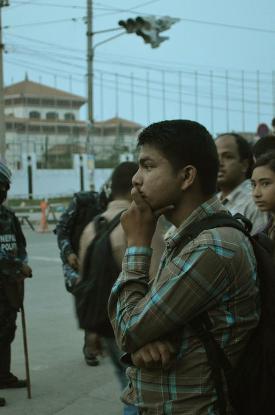
With the upcoming elections in Nepal I have been thinking more consciously of how important good political governance is and what it means for a country – especially a country at the bottom of the pyramid. Ever since the devastating civil war ended in 2006, Nepal – like so many other conflict countries – has struggled to find their foothold. The Constituent Assembly failed to draft a constitution upon extended deadlines after extended deadline and eventually fell last year in May when the deadline passed. So 6 years later, Nepal is going to hold constituent assembly elections – again.
After more than 15 years of ‘courtship’ with Nepal, I set up the organization Friends of VIN in early 2011. I defined it – among other definitions – as an NGO – a non-governmental organization, an organization that operates independently from any form of government, and it still is. I had the idea that together with the inhabitants of Nepal, we could bring about change that would have an impact on the country. And I still believe that we do make an impact – albeit a very slow one. Our creed is to empower marginalized communities in Nepal. This means working with one community for several years until they are ready to continue with activities and projects by themselves. Then we pull out our active presence and move on to the next one. ‘Empowering’ might come across as a ‘big’ word; it’s definitely one that’s being used a lot these days and perhaps even over-used, but to me it quite simply means ‘to make people REALIZE that they CAN change their situation’ – mostly people just need a little nudging from organizations like Friends of VIN or some of the many other organizations in Nepal which work towards alleviation of poverty. But that is just that – nudging and facilitating change. But I’m truly starting to see and believe that if Nepal is really going to change, it must start with a government who cares and takes responsibility for crucial issues such as education, health care, and basic human rights. Unless these issues become central points on the government agenda, nothing much will change I fear. The politicians will continue to pocket most of the foreign aid money in a number of genius ways and NGOs and other grassroots organizations will continue to infuse funds and human resources in projects where the risk is that the majority are not sustainable in the long run unless they are supported by the government.
Don’t get me wrong, we shouldn’t dismiss foreign aid and what the numerous NGOs have brought Nepal. Without this Nepal might be in a worse condition. But while thousands of NGOs in Nepal work towards poverty alleviation, better living conditions and in general better human rights, most of these work more or less isolated from the government. And you cannot blame them, first of all the problem is that there is no government in Nepal let alone a constitution, so of course it makes it very difficult.
Recently I started reading a book called ‘The Bottom Billion: Why the Poorest Countries are Failing and What Can Be Done About It” written by Paul Collier, a professor of Economics at Oxford University. And it is clear that his findings are very true for Nepal. He identifies 4 main reasons why poor countries stay poor where at least 3 of these apply to Nepal; 1. The conflict trap: civil wars and coups incur large economic costs to a country; 2. the natural resource trap: Countries that are rich in natural resources are paradoxically usually worse off than countries that are not; 3. Landlocked with bad neighbors: Poor landlocked countries with poor neighbors find it almost impossible to tap into world economic growth, and although Nepal’s neighbors are not that poor and whose economies have shown 2-digit growth, there’s little need to import any goods that could be manufactured in Nepal as they are both in a condition to produce it themselves for just as little and with better infrastructure they are able to have these goods distributed easily; and 4. Bad Governance in a Small Country: The reason small countries are at a disadvantage is that though they may have a low cost-of-living, and therefore be ideal for labor-intensive work, their smallness discourages potential investors, who are unfamiliar with the local conditions and risks, who instead opt for better known countries like China and India - the neighbors of Nepal.
So while we’re waiting for a government in Nepal and preferably a government who cares about its country and its people, we will continue our efforts to facilitate social change for the poorest and most disadvantaged. Because until there’s a government, we cannot start a trialogue between the citizens in the local communities, the government and us; we just cannot start to create lasting change.










Add new comment